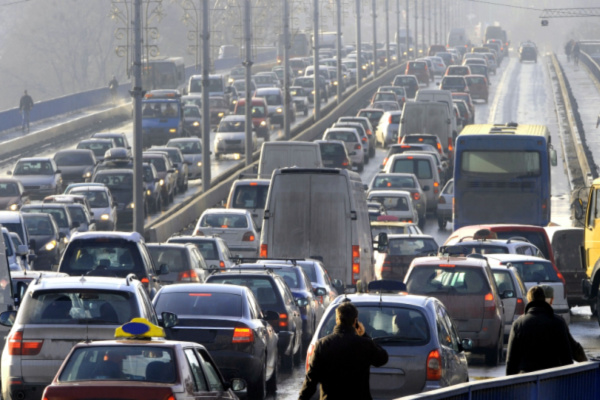Air that’s polluted by traffic exhaust can spike people’s blood pressure sharply almost as soon as they begin traveling, according to a study that monitored people in real time on busy roadways.
As NBC News reports, the findings — published last week in the journal Annals of Internal Medicine — suggests that roadway pollution not only poses risks that build up over time, but also that it prompts near-immediate changes to people’s physiology. The study provides some evidence that suggests sitting in traffic could help trigger medical conditions such as heart attacks and strokes, though more research is needed to establish clear links.
The study is the first to measure both pollution and its effect on blood pressure in real time from inside a vehicle as it travels. Researchers monitored both measures dozens of times through traffic in Seattle.
“We were surprised by the magnitude of the blood pressure changes, given the small levels of pollution we measured,” said Dr. Joel Kaufman, a University of Washington professor of medicine, epidemiology and environmental health sciences and an author of the study.
The study’s results include the data of just 13 people, but it adds to a long list of research outlining growing concerns about the health dangers of pollution on U.S. roadways, mostly from tailpipe emissions and wear on tires.
“This adds to a growing body of literature that is increasingly convincing that air pollution on and near roadways is hazardous to your health,” said Doug Brugge, a professor and chair in the department of public health sciences at the University of Connecticut, who was not part of the study. “Driving on roadways — commuting, driving in heavy traffic — is an understudied concern that deserves more attention.”
To evaluate how traffic air pollution affects people, the researchers sent people on two-hour trips along Seattle thoroughfares, including Interstate 5.
The vehicle was equipped with a more powerful air filter than most cars typically have. An air filtration device was strapped into the passenger seat, pollution monitoring equipment in the back seat and a fingertip device to monitor participants’ blood pressures, Kaufman said.
On some trips, the filters were operating and on other trips, the filters were convincing shams. Participants never knew if the filters were operating properly or not. When the air filters were working, the devices together reduced particle pollution inside the vehicle by about 86%, on average.
Pollution levels were never terrible. On trips when shams were in use, the average air quality index inside the car was only 36, which would get a “low” rating from air quality agencies, Kaufman said.
Each participant took three drives: One when filters were working, and two when they were not. The researchers found, on average, people’s blood pressure levels rose significantly — about 4.5 mm of mercury, a measure of pressure — when the filters weren’t working.
“That’s a meaningful elevation,” said Brugge, who researches ultrafine particles, which aren’t regulated in the United States and may play a significant role in the health effects of pollution near roads.
Kaufman said doctors often tell people struggling with high blood pressure to pursue a low sodium diet or to avoid certain prescription drugs. The spike in blood pressure observed during unfiltered traffic is roughly equivalent to those measures — and in the wrong direction, he said.
The study has limitations. It only included results from 13 people, and conditions during drives were similar but not identical. Brugge said he is concerned that factors like differing noise or vibration on trips could skew the study’s data. He said additional research that includes more people is needed to firm up these results.
Researchers have linked traffic to heart attacks in the past. A study in Germany found that the odds of having a heart attack was almost three times higher if people were in traffic within the preceding hour. Previous laboratory studies have shown that people’s blood pressure spiked after exposures to diesel fumes.
Worldwide, more than 8.3 million deaths each year can be attributed to air pollution, according to an estimate from a study published Thursday in the BMJ (formerly the British Medical Journal). Phasing out fossil fuels would prevent nearly two-thirds of those deaths, the BMJ study says.
Brugge said new research like this broadens the understanding of air pollution’s harms and overall toll. “Air pollution is one of the top five public health problems in the world,” he said. “What they’re looking at, and we have been studying, are additional air pollution concerns that aren’t even in that calculation yet.”
—
Photo Credit: bibiphoto / Shutterstock.com
